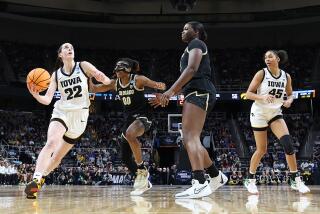TENNIS : Capriati Hurts Her Case : Her statement requesting an end to discussion of her past only serves to intensify questioning.
- Share via
NEW YORK — If you’ve been in this business for a while, you freeze frame certain athletes and moments. I have many, including a couple involving Jennifer Capriati, the tennis player turned tennis dropout.
One freeze frame from 1991:
Centre Court at Wimbledon, quarterfinal against an aging but still quite competitive Martina Navratilova. There is a key point. Navratilova slices and charges. Navratilova made a fabulous career out of slicing and charging. Capriati, age 15 years 95 days and already the youngest player to win a match at Wimbledon when she made her debut the year before, scampers to her backhand side and flicks a near-impossible topspin lob off the slick grass that gets over Navratilova’s head and flops down inside the baseline. Capriati is the youngest-ever Wimbledon semifinalist; Navratilova is done, her earliest Wimbledon exit in 14 years.
Another from 1993:
U.S. Open, Center Court, first round. Capriati versus unheralded Leila Meshki, a baseline pounder of many years and little note on the tour. In what seems like a flash, Capriati is gone, ousted, embarrassed. They walk off the court, Meshki looking puzzled and Capriati shocked and confused.
Monday at the U.S. Open, there was a third freeze frame, and the startling thing was that, while it was designed to be a Navratilova moment, it quickly became a Meshki all over again.
Capriati, 23 now and making a nice comeback run to No. 40 in the rankings, had played Monica Seles in an attempt to get to a Grand Slam quarterfinal for the first time since Wimbledon in 1993. She had lost, 6-4, 6-3, in a match in which she showed glimpses of past power and speed that brought her all the way to No. 6 in the world back in the early 1990s.
And now, she was sitting before the media for yet another of those news conferences that a few of the players enjoy and most merely endure.
What came next was fairly unusual, and it quickly got bizarre.
Capriati read a statement that she said she had written herself before the tournament and had waited to read until the proper time. Now that she was out of the event, she felt it was the proper time.
The statement, in its totality, is in the adjoining columns. Its purpose, basically, was twofold:
* To come clean publicly and apologize about her behavior during her roughly six-year absence from the women’s tour, behavior that included a shoplifting charge, an arrest on charges of marijuana possession and an admission that she spent some time in drug rehabilitation.
* To say that she is closing the book on all that, that she wants no more questions about it and will deal with them no more.
That was quite the head-scratcher, for a number of reasons.
First, she really hasn’t been dogged for details about the past. Questions posed during her comeback this year have pretty much been framed stressing the recent past, and looking toward the future.
Also, if she felt a need to publicly say she screwed up, fine, even though we all pretty much knew that. But then, to expect it to just all be tucked in a nice little box and put on a shelf in the attic is foolish.
You can’t play on a public stage and not expect a public persona. She has managed to bank close to $2 million in prize money in her career, all of it paid directly or indirectly by public ticket-buying and public TV-watching.
You want to be left alone, become a nun.
As the press gathering went on, things went from bizarre to extra weird. She was asked about a great match she played and won against Seles in 1991 at La Costa. It was an appropriate question in light of the fact that the two had just played again.
She replied that she wouldn’t talk about the past.
Soon, she was asked about the 1991 match she played in the U.S. Open semifinals against Seles--a classic match that Seles won in three sets after Capriati served twice for the match--and about her Olympic gold medal the next year in Barcelona.
“We can talk about those,” she said, giggling.
Soon, it became clearer that, once again, she had gotten bad advice from those around her. Better that she had just left it alone, just continued on her nice comeback trail that had become the main topic of conversation; better that she just address, with dignity and poise, the occasional question that still seemed headed back to the drug stuff and let it eventually die a natural death of age.
Instead, she tried to make ground rules she can’t make, and blurred things even more.
Soon, she was being asked where the cutoff was--could she be asked about things starting with her comeback in ‘98, or in ‘96? Did she really write the statement or did somebody help her--the phrases “envelope of my past” and “experiencing my adolescence” and “path of quiet rebellion” appeared to be a bit more Ernest Hemingway and Jim Murray than Jennifer Capriati.
And, finally, the benign-sounding question that, for some reason, pushed this from the extra weird into a sort of final twilight zone.
“Do you still see the media as your adversary,” she was asked.
Suddenly, her head was down on the table and her body racked with sobs. After about two minutes, while everybody in the room sat stunned, squirming and alternately feeling embarrassed for her and sorry for her, an official took her away and she headed down the long hallway at the Ashe Stadium complex, her father, Stefano, on her left and a New York Times reporter, arm around her shoulder, on her right.
The buzz spread quickly. Soon, CBS was showing clips of Capriati, head down and sobbing, and tennis player turned commentator Patrick McEnroe, never to be confused with Woodward, Bernstein or Ted Koppel, was telling the world how the “press made Jennifer cry.”
“They will keep pecking away until they get the story,” McEnroe said, with the proper amount of disgust in his voice.
Shortly, CBS ran the clip again of Jennifer crying. And again. That was probably because they couldn’t find the old film of Joe Theismann breaking his leg.
Sadly, another chapter of Jennifer Capriati’s life is now an open book. Sadly, it was so close to being put up there on the top shelf, with the other old dusty ones.
*
* NEWSY DAY
Jana Novotna announces she will retire; Serena Williams advances. Page 8.
More to Read
Go beyond the scoreboard
Get the latest on L.A.'s teams in the daily Sports Report newsletter.
You may occasionally receive promotional content from the Los Angeles Times.











